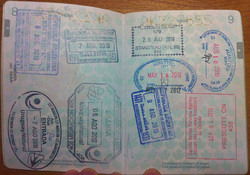
If you entered the United States without being legally admitted and inspected, then any period of time you have accrued in the United States will be counted as unlawful presence. Unlawful presence is very dangerous and can create a bar to most types of relief from removal as well as a bar to subsequent legal admission into the United States.
Under Section INA §212(a)(9)(B)(i)(II), if an individual has been unlawfully present in the United States for one year or more and the individual subsequently “departs” or is removed from the United States, the individual may not again seek admission into the United States within 10 years of the date of departure. However, the good news is that this bar to admission after a period of unlawful presence can be overcome by a certain category of people.
For those who entered without inspection and were later granted Temporary Protected Status (TPS) or now qualify for TPS, you may be able adjust your status by means of applying for advance parole. Also, Dreamers who qualified for, and received “deferred action” under the Deferred Action for Childhood Arrivals (DACA) program, you may also apply for advance parole.
If you have been granted TPS or deferred action, you are eligible to apply for advance parole. Important: you cannot file for advance parole until you have been approved for TPS or deferred action. But once you receive your advance parole, you may exit and re-enter the United States with your advance parole document. The Board of Immigration Appeals in a recent case, Matter of Arrabally and Yerrabelly, 25 I&N Dec. 771 (BIA 2012), held that “[a] departure under advance parole does not trigger the inadmissibility ground under 212(a)(9)(B)(i)(II).” Therefore, leaving the United States under advance parole does not trigger inadmissibility and you will be able to re-enter, this time with inspection. Once you have been paroled into the United States with inspection, you may adjust pursuant to INA §245(a), and will not be barred from adjustment because of inadmissibility under §212(a)(9)(B)(i)(II) (the “10-year bar” - or ley del castigo.)
For many people who do not or cannot risk a provisional waiver on Form I-601A, an Arrabally adjustment provides a much easier way to normalize status.
Questions? Want to see if you might qualify? Call or text us at 703.964.0245, or fill out the contact form on this page. We'll let you know if it makes sense for you to file for advance parole and leave and re-enter.
CAUTION: Leaving the United States when your immigration status is not permanent always has some degree of risk. Do not leave the United States - even under a grant of advance parole - without talking to a lawyer first.
Sharifa Abbasi, Esq.



 RSS Feed
RSS Feed
